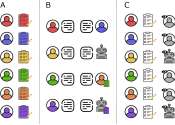Education in its broadest sense is any act or experience that has a formative effect on the mind, character, or physical ability of an individual. In its technical sense education is the process by which society deliberately transmits its accumulated knowledge, skills and values from one generation to another through institutions.
Teachers in such institutions direct the education of students and might draw on many subjects, including reading, writing, mathematics, science and history. This process is sometimes called schooling when referring to the education of youth. Teachers in specialized professions such as astrophysics, law, or zoology may teach only a certain subject, usually as professors at institutions of higher learning. There is also education in fields for those who want specific vocational skills, such as those required to be a pilot. In addition there is an array of education possible at the informal level, e.g., at museums and libraries, with the Internet, and in life experience.
The right to education has been described as a basic human right: since 1952, Article 2 of the first Protocol to the European Convention on Human Rights obliges all signatory parties to guarantee the right to education. At world level, the United Nations' International Covenant on Economic, Social and Cultural Rights of 1966 guarantees this right under its Article 13.









